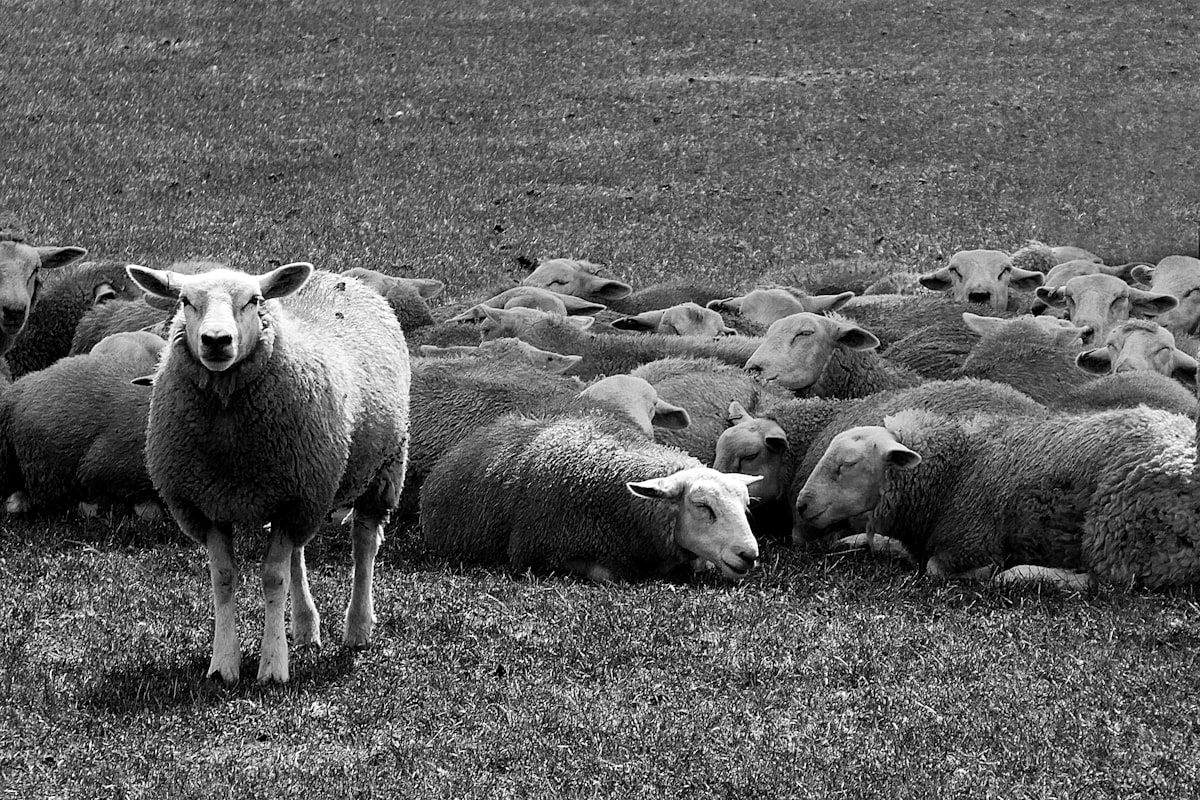Creative writers don't look backwards
Writing to the market's demands can work, for awhile. But you won't build a career unless you do this...

Replicate, don't innovate.
Have you heard that advice?
"Don't recreate the wheel. Find what's working and start there."
That might sell you some books in the short term.
What it won't do is build relationships with your readers.
You can't be the leader if you're always chasing after the herd's whims.
Position yourself as a follower and you'll eat dust
Like the writers of zombie romance and vampire romance and YA dystopias.
Riding trends is for opportunists.
Joanne Rowling and Stephanie Meyer and Suzanne Collins didn't copy what was working.
They hijacked a category and took it over.
All the authors who jumped into the gold rush? They fought over the scraps falling off the table of the big franchises.
Kim and Mauborgne called this the "Red Ocean" in their eye-opening book Blue Ocean Strategy.
The ocean turns red when the sharks catch scent of blood. In the rush for food, they'll even attack, maim, and kill each other.
That's what happens when a market opens up competition. The product becomes a commodity and the players kill each other by driving prices to rock-bottom.
If you're only competing on price, you're dead in the water.
That's one lesson. The other:
Don't swim in red oceans
Easier said than done.
Let's start with what I'm NOT saying.
I'm NOT saying that you can or even should aim to be the next Rowling or King or Koontz or Patterson.
Those are object-goals. You don't have much (any) control over those outcomes.
Consider this a "mindset hack". It's more to do with your attitudes about creativity.
That part, you can control.
If you see your writerly creativity as an industrial process carried out by assembly line, well... good luck writing stories that anyone wants to read (which aren't romance or pr0n).
Romance and pr0n get an exception because they have a built-in and nearly inexhaustible demand.
For everything else, you've got to think.
You've got to be creative.
Use your imagination to its fullest.
The mechanics of writing are only the beginning of skill.
Writing good stories goes far beyond technique.
We're talking about the intangible. That quality of good writing that makes it compelling, nigh addictive, impossible to put down.
Grammar-obsessed finger-wags haunting the writing forums and chats don't get this.
They believe that they write good stories because they tick off the Strunk and White checklist.
Think again.
Without imagination, personality, and voice, the best craft on the planet won't get you a single reader.
But if I just write what I want, nobody will want to read it
True enough.
There's another NOT from me:
Indulging your fan-fic passions is not the suggestion.
Ditto for copying the sniffy style of broke MFA grads.
Remember this:
There is no barrier between good art and popular entertainment.
You can be paid well indeed for entertaining the masses while producing excellent work.
Look down your nose at Koontz, King, or John D. MacDonald as you will... but they've entertained far more readers -- with far more stories -- than the artiste who won't ever sell even 1000 books in a lifetime.
How do you strike the balance between writing to sell books and writing what you want?
Have a unique point of view, and know how to convey that to the reader.
My suspicion is that most of the indulgent crap belched forth from the Id of "what I want to write" is infected by MFA elitism
The beginning writers (and they are almost always beginners) who believe this say it on the assumption that "good writing" can't be fun to write, fast to write, or appeal to a wide audience.
The emotional turmoil and difficulty getting traction with a book (always A book, never 10 or 27 books...) are indicators to the artiste that they are doing it right. No suffering, no writerly credentials.
Poppycock.
Writing what you want to write does NOT mean giving in to every impulse that enters your untutored skull.
There is such a thing as discernment.
What I want to write now, after soaking and fermenting in prose for several decades, is not what I wanted to write as a fresh-eyed 20 year old.
Tastes change. This is not an aimless process. Experience and acquaintance lead to refinement.
Which leaves us with a paradox.
To be creative means leaving the past behind for a new and different future.
To do this, you must curate and cultivate your imagination.
Creativity is partly about looking backwards.
But if you never look ahead, you're going to wander right into that yawning canyon.
Finding your unique point of view is about looking at what's working... and then finding your distinction
PS – If you enjoy these posts, why not subscribe? That way you can receive them directly in your inbox... and you'll get the members-only posts.
As a bonus perk, members can be a part of the private rogue planet community, where you can discuss this article and hang out with other SFF Heretics. It's not another privacy-thieving jumble of a Facebook group, either.
There's no charge (yet) to subscribe as a free member, so click here and join now.

